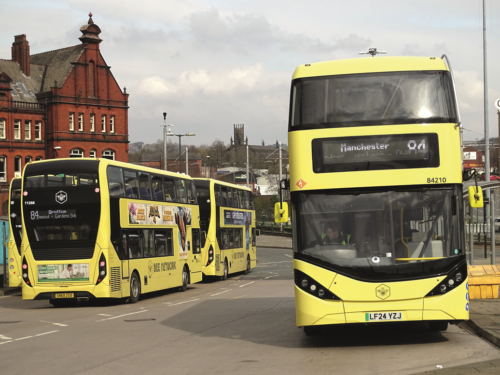
Ahead of a general election, the Labour Party has set out how it sees the future for bus services across England
Labour’s shadow transport secretary Louise Haigh MP has set out the party’s plans for a better bus network across England should it win the next general election, with a promise ‘to allow every community across the country to take back control of local bus services.’
Labour says it’s plan could ‘create and save up to 1,300 vital bus routes’ and allow as many as 250 million more passenger journeys per year compared to what it calls ‘today’s failed system.’ It also promises ‘safeguards over local networks across the country.’
Labour says its plan will also see better buses delivered faster, with franchising done in as little as two years compared to what it refers to as ‘Greater Manchester’s six-year slog due to unnecessary barriers imposed by central government.’
The party cites figures which show that ‘since buses were deregulated in 1985, bus services in England’s regions outside London have collapsed, with 1.5 billion fewer annual bus journeys in 2019 than in 1985, almost 300 million fewer miles driven by buses per year since 2010, and thousands of bus services cut since 2010, though it fails to qualify whether these figures were also impacted by growing car use, a trend towards decentralised shopping, and other factors beyond the control of bus operators.
Labour believes its plans will ensure better value for money for the taxpayer, deliver a better service for passengers and give local authorities a choice over the bus system that works best for them. The plans will require no additional central government spending, it says.
The party states that where bus franchising is in place, namely London and Greater Manchester, ’buses have thrived.’ Speaking at a launch event in the West Midlands with Labour’s Mayoral candidate Richard Parker, Louise Haigh said that, during its first term, a Labour Government would pass new legislation to support local transport authorities to take back control of their bus services and has set out a five-point plan to deliver better buses. She said Labour will:
- Empower local transport authorities and reform funding;
- Allow every community to take back control of its buses by removing barriers that currently limit bus franchising powers only to metro mayors;
- Accelerate the bus franchising process;
- Step in to safeguard local bus networks by providing more accountability over bus operators and ensuring standards are raised;
- Support public ownership by ‘removing the Conservatives’ ideological ban on publicly owned bus companies’ and ‘building on the success of award-winning public bus services still in operation.’
Basic values
The Shadow Transport Secretary, said: “Reliable, affordable and regular buses are the difference between opportunity and isolation for millions of people across the country. Four decades of disastrous deregulation of Britain’s buses has robbed communities of a say over the vital services that they depend on, instead handing power to unaccountable private operators who have slashed services.
“Labour will give every community the power to take back control of their bus services, and will support local leaders to deliver better buses, faster. Labour’s plans will create and save vital routes and services, end today’s postcode lottery of bus services, and kickstart a revival of bus services across England.”
Labour’s candidate for West Midlands Mayor Richard Parker added: “Under the Conservatives thousands of vital bus services have disappeared and local communities have been left powerless, with no tools to hold operators to account. As Mayor of the West Midlands I will end this broken system and bring our buses back under public control. With a Labour Mayor for the West Midlands, and a Labour Government in Westminster, we can work together to deliver better buses, faster.”
CPT response
Confederation of Passenger Transport (CPT) CEO Graham Vidler commented: “CPT and its members are committed to working with local leaders whatever the regulatory model any future government may bring forward for the sector. Operators in Greater Manchester for example are working flat out in cooperation with the Mayor to ensure successful delivery of the new Bee Network.
“Local leaders already have extensive opportunities to influence and shape delivery of bus services through the contractual arrangements available under ‘enhanced partnerships’. Local authorities and operators in places like Leicester, Portsmouth and Norfolk are already demonstrating the extent to which real improvements in the passenger experience can be delivered without further regulatory reform.
“Whatever the regulatory approach, we know that passengers want more bus services going to more places that are also more reliable and more swift. Better buses will require a stronger focus and sustained investment in these passenger priorities, something we call for in our manifesto for bus Driving Britain Forward.“

